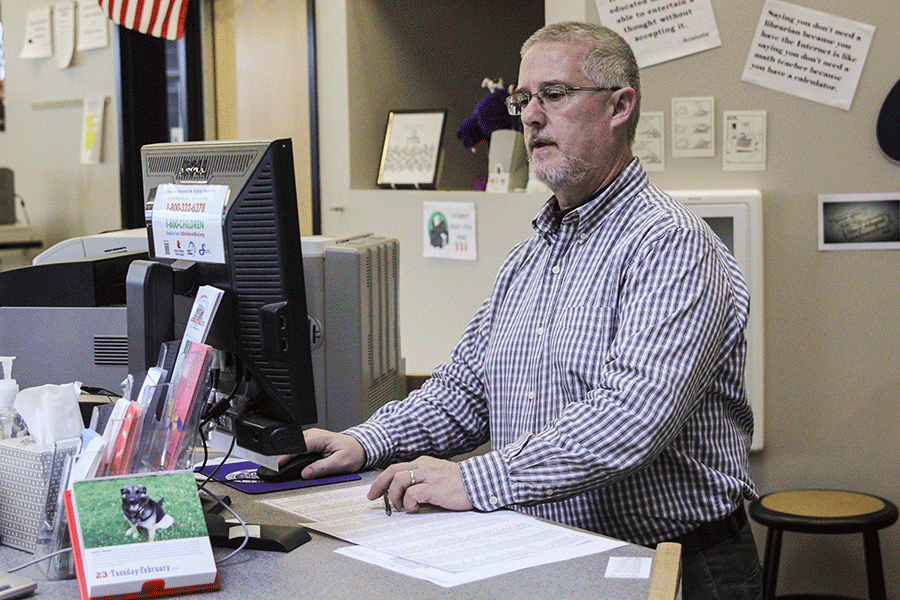E-books soon to be made available to library
Media Center makes titles available to students online in affiliation with the Johnson County Library
By Nick Precht
Media specialist Andy Shelly works on the computer at the front desk of the library on Tuesday, Feb. 23.
March 10, 2016
The De Soto school district and Johnson County Library have come together and will be offering the option for students to check out e-books and audiobooks, beginning in March.
Students can check out up to ten e-books or audiobooks, from a selection of over 4,000 titles, and keep them for three weeks, according to the Johnson County Library’s website.
For the students of Mill Valley, e-books will be accessible on Axis 360, an app available for download on iOS, Android, Windows and Amazon Kindle.
After his introduction to the concept almost two years ago, media specialist Andy Shelly has high hopes for the new e-book system. He imagines it will encourage students to spend more time reading.
“Whether it ends up being in an electronic format or ends up being in a book format, everybody has their preferences,” Shelly said. “It’s no different than the way people like to do research, or like to study, or whatever else. They have their personal preference, but, hey, it’s all the same thing.”
Because of his passion for reading, sophomore Jack Ball finds himself in the library checking out physical books once or twice a week. He is looking forward to the benefit of reading multiple books at a time with e-books.
“I’m happy, a little bit, that we’re branching out because with this option now, it encourages a little more reading for a lot of students,” Ball said. “It also opens a much more wide range option. There are some books in our library doesn’t carry, so it would be best probably if we had a better range of titles.”
While both Ball and Shelly anticipate students using e-books for reading, communication arts teacher Peter Shull sees them utilizing e-books for classwork. Rather than instigating recreational reading, he figures the e-book system to be another strategy for students to access necessary materials for their classes.
“In the recent past, students who have left their books or homework at home, have been able to, because of the internet, to access information that they wouldn’t have had access to otherwise,” Shull said. “And these electronic resources do increase our access and help us get more done.”
Even though Ball doesn’t read e-books as often as physical books, he still sees e-books as a more efficient way of reading.
“Instead of having to lug a whole library in your backpack, you can have several titles on your phone,” Ball said. “It’s easy to download it all. It’s immediately right there on your phone. You don’t have to drive off to the library or walk to the library.”
According to Shull, “a lot of people expect [him], as an English teacher, to be kind of ‘old school’ and be opposed to electronic books,” yet the only thing he is worried about are authors not receiving the appropriate amount of money for their work and the health of the students.
Although Shelly understands that not every student is going to be open to the idea, he is still confident there will be kids taking advantage of e-books.
“I know some kids say ‘I don’t want to read a book on my phone,’ but you could read that at a tablet, on a laptop, or whatever else along that line,” Shelly said. “I’m hoping that this aspect of reading, in terms of being able to read books electronically, is something that kids will give a try and … if it increases the amount that they end up reading, that’d be fantastic.”











